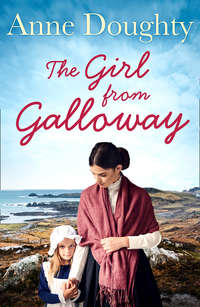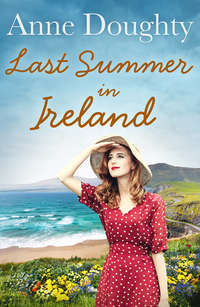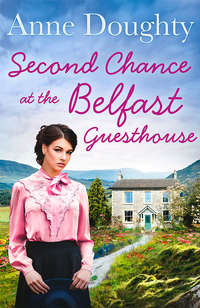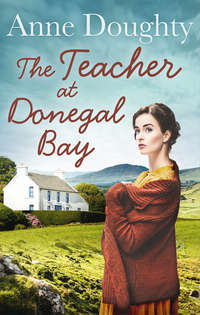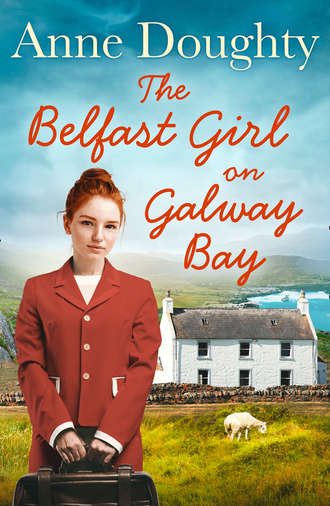
Полная версия
The Belfast Girl at O’Dara Cottage
Mary said nothing, but I could see she was amused. We waited.
‘God bless all here,’ he said heartily. ‘I’m sorry, Mary, that I was unavoidably detained. I met some Yankees from Australia.’
Chapter 4
It isn’t Paddy who has the hangover this morning, I thought to myself, as I sat munching wheaten bread at breakfast next day. He had been in such sparkling form the previous evening that we had sat by the fire till midnight. He’d told me stories from every part of his life, moving back and forth across the Atlantic and the decades of his seventy-odd years with equal ease and a fluency that had me spellbound.
He had such a gift with words. Everything he said was put in a simple, direct way but out of that simplicity he built something much more complex. The atmosphere he created was so very potent that as I listened to his stories, some happy, some sad, some cautionary, I felt sure I was experiencing something quite beyond the actual events he was recounting. It came to me that Paddy’s stories were like parables for in them he had concentrated the wisdom of a long life lived with passion and humanity. I had gone to bed, my head full of Paddy’s stories, and spent a dream-haunted night reliving stories of my own.
‘God bless all here.’
The dark-caped figure of Paddy the Postman stood in the doorway, a hand half-raised in greeting. I’d been so far away that I had neither seen the bob of his cap above the hydrangea, nor heard the scrape of handlebars as he leaned his ancient, regulation bicycle against the wall of the dairy.
‘God bless you, Paddy. Sit down and rest yourself, till I get you a drop of tea.’
He sat down, his cape dripping gently from a sudden shower. ‘Ah, miss, I have a handful for you today,’ he said. He counted out three letters for me.
‘Well, what’s news in the world today?’
Paddy O’Dara put down his blue enamel mug. He’d persevered with the delft cup and saucer for two days after my arrival until Mary had absentmindedly taken the mug from the dresser. He clutched it thankfully and the cup and saucer did not reappear.
‘Good news. Mary-at-the-foot-of-the-hill has a wee boy and all well. Seven o’clock this morning.’
‘Ah, thanks be to God,’ said Mary, crossing herself. ‘I’ll go down and see the poor crater after a while.’
‘There’s Yankees arrived at John Carey Thatched House and his brother’s over from Kilshanny. There’ll be a big party tonight, I’m thinking. Flannigan’s lorry was there delivering crates of porter.’
Paddy finished his tea at a gulp and stood up. ‘God bless you, Mary, that was good, but I must be like the beggar man, drink and go, for I’ve a packet for Flaherty’s beyond the Four Crosses.’
‘Ah, ’tis a good way that, Paddy, and mostly uphill,’ Mary nodded.
‘And we’re not getting any younger,’ said Paddy ruefully, as he settled his mailbag on his shoulder and put his cap on.
‘Good luck till ye.’
‘Good luck.’
I began to stack the cups and plates at one end of the table, but Mary stopped me.
‘Sure leave them, astore. Aren’t you going over to Ballyvore. And I’ve not much to do today.’
It was highly unlikely that Mary had not much to do. I had seldom seen her finish her daily round before supper. But I sensed that often she was glad to be alone, with me out pacing the fields and Paddy working on the land or in the haggard.
‘Will I need my wellingtons, do you think, Paddy?’
‘Ah no, it won’t be that wet. The path is rough, but it doesn’t flood and the wind’s been drying between the showers.’
I collected my plastic folder of field maps, put the letters in my pocket and zipped up my jacket. ‘I’ll be back by one, Mary, is that all right?’
‘As right as rain, astore.’
‘Mind yourself, Elizabeth,’ Paddy warned severely, ‘Ballyvore is full of old bachelors and wouldn’t they just like me to make a match for them with a nice, slim, young girl like yourself.’ He laughed as he stumped off to the garden to dig potatoes.
Slim. I smiled to myself as I set off up the road. No one had called me slim before. After my ‘skinny’ phase in early childhood, I had begun to put on weight when I was about eight years old. Despite the removal of all sweets, chocolate and cake from my life and my mother’s continuous nagging not to eat this or that, or anything I put my hand out for, it was my late teens before I suddenly shed the flabby layers that had made my late childhood and teens so miserable. For years now, I had shut out the memory of those unhappy times. The teasing at primary school was bad enough, but what happened at grammar school was even worse. The games mistress made me run round and round the gym every morning before prayers. Remedials, she called it. My face would prickle with heat, I’d get a stitch in my side, and afterwards I couldn’t find my place in my Songs of Praise, because my hands were shaking and sticky with perspiration. Those days were long gone. Thank Heaven.
But slim. I could hardly think of myself as slim. Certainly not compared with Adrienne. Perhaps Adrienne was a bit too slim. George said she had a marvellous figure but he preferred his women cuddly, like me. He said he was glad I wasn’t sylphlike. Often, when we were lying together on the sofa in his mother’s sitting room, or on a rug on some beach or hillside, he would put his head in my lap and say that I was built for comfort. But Paddy thought I was slim.
I turned to look back at Lisara and to study the new perspective from the high point I had reached on the long curving slope of the road. Funny how people see you differently. George. Paddy. My mother. Mary. It made me wonder how you could ever tell what the truth really was when people offered you so many different versions of yourself.
Just over a mile from the cottage I came to a weather-beaten signpost. It didn’t say anything for the arms had long ago dropped off, but the track which led away to my left was clearly used. It was rough, but some of the bigger holes had been filled with stones. Apart from that, there wasn’t much other sign of life about. No houses were visible either behind or before me. The hedge boundaries were overgrown and the fields were full of rushes. The trackway to my right that led down to the cliffs was identifiable only by the parallel stone walls. Its whole length was filled with the luxuriant growth of grass and bramble.
The bank below the signpost was smooth and mossy. I sat on my plastic-covered maps and took out my letters. I fingered the two from George in anticipation and laughed at myself as I put them to one side. I always save the nicest things till last. Adrienne always says you can tell a great deal about a personality from that simple observation, but whenever I ask her to explain exactly what you can tell, she never does.
My mother’s letter was a single large sheet. It had been written hastily in blue biro on the strange-smelling, pink paper she had been using for years, a line that hadn’t sold in the shop. ‘Dear Elizabeth,’ I read,
Dad and I were glad to get your letter and hear that you had found somewhere to stay. It sounds reasonable considering but be careful of a damp bed. You can’t be too careful in these places. Things are much as usual. We are very busy in the shop. It’s amazing how trade keeps up especially cigarettes. Dad had to go to the Cash and Carry twice last week. Everyone has money these days especially (the Other Side). I don’t know how they do it what with the big families and what they have to pay the church. Of course they have the big family allowances and the national assistance. The house at the end of St Judes the one with the orange lilies has been sold to one of them. One of our customers says the church puts up the money for them. They’re getting in everywhere round here.
I paused. Even the irony of the Other Side having bought the house with the orange lilies failed to raise a smile. My mother puts on paper exactly what she thinks. Given how I feel about most of what she thinks, it was hardly surprising I’d find a letter upsetting. I just hadn’t been prepared for it. Listening to what she said, evening after evening, I had learnt to filter out the things that upset me, but seeing them written down in tangible blue biro was another matter. I couldn’t filter out the words and what they meant. She’d even written ‘the Other Side’ in brackets, like a stage direction, to remind me of the customary lowering of the voice.
Mary and Paddy were ‘the Other Side’. So was Patrick Delargy, a man who had talked to me as a friend and driven me home to save me a walk and a wetting. Just by being here in Lisara, I was doing something neither of them could accept. There would be no talk of my visit when I went back, no interest in anything I’d done. My father would put the event out of mind, as he always did with anything uncomfortable. My mother would wear that tight, thin-lipped look of hers, if I were foolish enough to mention the visit myself.
Once, long ago, I had made the mistake of suggesting that some Catholics might be quite nice people. I have never forgotten the look she gave me.
‘Don’t ever let anyone hear you say a thing like that,’ she warned me, two bright spots of colour flaming on her cheeks.
My father had actually lowered his newspaper, a rare thing for him to do. ‘Indeed, Elizabeth,’ he said, in a tone intended to sound both conciliatory and wise, ‘that’s all very well, but when all’s said and done, you know, you can’t trust one of them.’
I never raised the subject again, or expressed any further opinion, but I did wonder what strange power it was that produced such hatred and fear.
I shivered in the chill wind and turned back to the rest of the letter.
Clare Roberts that you were at school with has got engaged to Clive Robinson the shop. They are going to live in Helen’s Bay. Clive has got a big job with the Co-op and they have bought a lovely bungalow with an L-shaped lounge. Her mother says it is the last word. She is very pleased I was speaking to her on Monday. She also told me Mary Dalzell as was had a lovely baby boy born on her birthday. What a coincidence. They are calling it William John after the grandfather.
That was the trouble with the shop. It meant my mother heard all the news. All the girls I went to school with, married and having babies, or leaving their babies with their mothers to take ‘wee, part-time jobs’ so they could buy the velvet curtains for the L-shaped lounges, or clothes for their Spanish package holidays. Perhaps it was my imagination, but I sometimes thought the only time my mother ever looked at me was when she talked about my contemporaries. It seemed as if she were waiting for me to say something. But whatever it might be, I’d never managed to say it. Her face went hard and disapproving, no matter what comment I made.
A graduation photograph on the piano in the seldom-used sitting room over the shop and a married daughter in a lovely bungalow in Helen’s Bay. Was that the future she wanted for me?
The single page of the letter was flapping in the stiff breeze and my fingers were numb with cold.
Dad has started to do up your room. He thought it was a good chance. Uncle Jamsey got us the paper from his work 30% off. It is a nice big green leaf with gold on white. Dad says it will dirty awful easy but you only have a year to do. He has only the woodwork left. You said white but he thought it would look a bit bare so he got a nice cheerful yellow at the cash and carry. I have no news at all from the country so will close now. Mum.
I suddenly began to feel very depressed. At first I thought it was the green and gold wallpaper, which sounded hideous. Then I wondered what they’d done with my precious maps and postcards that I’d been able to sellotape all over the walls, because the paper was brown with age and long overdue for stripping. My mother was quite capable of throwing the whole lot out.
No, it was something deeper than wallpaper and the lack of respect for my possessions. It was L-shaped lounges and babies called after their grandfathers. That wasn’t what I wanted. I didn’t know what I did want but it certainly wasn’t that. Just thinking about my mother’s news of the girls I’d been at school with made me feel afraid. Perhaps such things could happen to me too. Just like one of those road accidents you couldn’t possibly predict, where people get killed or injured, because they happened to be where they were at a particular moment.
I stuffed my mother’s letter back in my pocket and started to open the first of George’s. At that moment, the wind caught me. I looked up and saw the islands had already disappeared beneath the approaching squall. The grey, choppy sea had white caps and the first spots of rain fell chill on my cheeks. I put the letter away, stepped back onto the road, pulled up my hood and tied it awkwardly in place with my numb fingers.
A few minutes later, the squall hit me as I walked up the track to Ballyvore. Hail peppered my back and legs, bounced off the loose stones at my feet and drifted into the tangled grasses below the low stone walls. I bent my head forward and walked as fast as I could. I’d had a good look round and I knew there was no shelter anywhere. The only thing to do was keep going.
After the squally morning, the day improved steadily. By late afternoon the sky was a brilliant blue. Up on the floor of the quarry where I’d been collecting rock samples, I had to take off my jacket and then my sweater. When I opened the neck of my blouse and turned up my sleeves, I decided it was time to have a rest. I spread my jacket on one of the smooth surfaces at the foot of a layered rock face, stuck my rolled-up sweater behind my shoulders and leaned back in the blissful warmth. I thought about George.
In all the romantic novels, this would be the moment when he would come striding up the track. He would have come home unexpectedly, borrowed a car and driven down to find me. Now he would be in sight, looking everywhere, calling my name. But this wasn’t a romantic novel. George and I hadn’t seen each other since he’d gone off to England to his vacation job in the middle of June. I had wanted to go with him but the factory he’d found had no accommodation for women. That’s why I’d ended up at the Rosetta.
Earlier in the summer I’d thought a lot about our reunion. Whenever things got bad at home or when I felt especially lonely, before I started my job, I’d let myself daydream. Particularly, I thought of his arms around me. Not of kissing him or of our limited lovemaking, but simply of being held, of being safe in his arms, of feeling warm and secure.
I stirred myself, for my sheltered corner was so comfortable I was in danger of dozing off. I took out the letters I had been carrying with me since the morning, saving them for just such a quiet moment. I opened them quickly.
They were both rather short. The first had been written from the vegetable factory in Spalding. It said how much George missed me, how he longed to put his arms around me and how awful the campbeds were. Their Nissen hut had no hot water and the bog across the yard had been bunged up for days. He said the crack was good and his crowd had taken over a pub which sold Guinness and that the fish and chips were the best he’d ever had. He said I wasn’t to worry about him. He could cope with these things. The rest of the letter was an account of the practical jokes they had played on the supervisor to break the monotony of tending the pea belt, or watching the labelling machine.
The second letter was shorter still. The vegetables had come to a sudden end with a change in the weather, so he had packed up and caught the first boat home. He missed me terribly. None of our friends were around in Belfast, the students’ union was still closed, and he couldn’t have his mother’s car. She needed it for work since they’d stopped the estate bus. How wonderful it would have been if he could just have driven down and whisked me away from all those strange people and found us a nice place where we could be alone together, just the two of us, a long way away from Belfast. He hoped the work was going well and that I’d be back very soon. I was to let him know by return when he could meet me at the Great Northern.
I reread both letters several times to see if there was anything I had missed. But there wasn’t. Letters were such a poor substitute for being together, I reminded myself. And, of course, George didn’t like writing letters in the first place. He always said that scientists have difficulty with literary modes. Geography wasn’t really a scientific subject, he said, and anyway I’d always been good at English which was his worst subject.
Beside me a clump of tall, pink wildflowers began to sway in the light breeze. From their lower stems hundreds of tiny balls, like thistledown, drifted in front of me. They spun slowly in the sunlight, a hint of iridescence on their white fronds, some borne upwards by the warm air, some colliding, some few moving towards me, touching my warm skin, catching in my hair. I looked down the empty track and tried to re-enter my daydream. But I had the greatest difficulty remembering what George looked like.
I thought back to our first meeting. It was in my second year, a lovely, lively spring day just before the beginning of term. I came out of the front gate of Queen’s on my way up to the Ulster Museum and saw Ben sitting on the wall opposite the bus stop with a tall boy I didn’t know. Ben had hailed me, introduced George, asked if I had time for a coffee. We’d gone to the espresso bar across the road, talked for an hour or more and then gone for a walk in the Botanic Gardens. A few days later George found me in the library and asked me out.
It had been easy to get to know him. Although he lived on a new estate near Lisburn with his widowed mother, he’d gone to the same city-centre grammar school as Ben, so we knew many of the same people either from schooldays or from our first year at Queen’s. We began going to the weekly hops and to the film club. George worked hard and sometimes we would meet in the library and go to the union together for coffee. I was grateful for his company, glad to have someone to talk to when things got on top of me, when I felt suffocated by the flat over the shop and my mother’s complaints, or when my tutor was being awkward, pressing me for work I could only do if I had enough time to think it through.
George was easy-going. Nothing seemed to upset him. I had once thought I was easy-going, but I’d come to accept that I wasn’t. I was always getting upset over things and having to be comforted. And George was very good at that. What was the point in getting upset about things if you couldn’t alter them, he always said. It seemed he had a point.
I sat watching the swirling down and wondered about the name of the tall plant that had shed its seedheads with such enormous generosity. I picked some silky fronds from my black trousers and waved away a floating fragment that tickled my nose. As I moved my hand, the sunlight gleamed on George’s signet ring, the one he had asked me to wear before he went off to Spalding. I wore it on my right hand, but I knew very well that he hoped to replace it with an engagement ring as soon as we graduated. He’d never asked me to marry him, it just somehow seemed obvious that was what would happen. I hadn’t really thought about it till now.
Everyone assumed that because George and I had been going out together for more than two years we would marry. My parents certainly assumed that my bedroom wouldn’t be needed when I finished my degree and Adrienne Henderson was always asking where we would live and whether George would teach or try to get into industry, whether we’d stay in Belfast, or be prepared to move away for a time till George got established.
I took his letters out of my jacket pocket and looked at them again, the envelopes I had ripped open so hastily and my name written in biro on them. Miss Elizabeth Stewart. Perhaps it was being so far away that made my life in Belfast suddenly seem so very remote. What was it Patrick Delargy had said when he’d stopped to look at the islands? Something about distance lending perspective.
Perhaps, being so much older, he felt he had a lot to reflect upon. So much had happened to him. He had lost people he loved, given up a future he’d chosen to take up something he certainly hadn’t chosen. But nothing very much had ever happened to me. I’d lost my Uncle Albert the year I got my scholarship, but he was in his eighties so I could hardly complain about that. I hadn’t had to give up what I wanted to do and go and do something else.
‘Not yet, you haven’t.’
I heard Ben’s voice as clearly as if he were sitting beside me. One of his favourite phrases. If ever I told Ben I couldn’t do something, or I’d never been able to manage such and such a thing, he would always come back at me. Not nastily, but always firmly. You shouldn’t make closed statements about yourself, he said, because people and circumstances change all the time. Surely there were things I thought now that I never used to think, things I did now that I couldn’t do before.
I hadn’t noticed before how different Ben’s way of thinking about life was from George’s. I wondered if I would have noticed the difference had I not been sitting in the sun, in an abandoned quarry, over two hundred miles away from the low, red brick wall where I’d bumped into the two of them on a bright, spring morning that now seemed a very long time ago.
Chapter 5
‘Hallo, Elizabeth, I heerd you was here. Will ye come with me to the dense tonight? Me cousin Brendan has the van from his work an’ he says there’s room for wan more.’
As I stepped through the door of the cottage, a red-haired girl of about my own age hailed me cheerfully.
‘Ah, shure do, Elizabeth, do,’ urged Mary. ‘Go to the dense with Bridget. ’Twill be company for her and it’ll do you good. Ye can’t be working all the time. There’ll be a great crowd.’
‘The dense is great gas, Elizabeth,’ Bridget went on, tossing her short, coppery curls. ‘Isn’t the band down all the way from Belfast itself. They must have knowed you were here!’
It was a long time since I’d been to a dance without George, I was tired and I couldn’t think what I’d wear, but because I liked her immediately, I let Bridget persuade me. There weren’t many people I knew who’d walk two miles to offer a complete stranger a lift to a dance.
When Brendan’s van started bumping its way round a huge, crowded car park full of buses and minibuses, cars and taxis, vans, tractors, motorcycles and bicycles, I could hardly believe that the long, low building ahead of us was a ballroom. With its rusting corrugated roof and boarded up windows it looked more like a warehouse or a battery chicken unit. Its breeze-block walls were plastered with the tattered remains of posters and flourishing nettles sprang from its concrete base but as I peered out into the darkness I saw a long line of people queueing up at its entrance and a tail-back of vehicles spilling out into the road behind us.
It was some time before we got inside. Only one half of the building’s double doors was open and once over the threshold the four large men who were supervising the payment of seven and sixpences created a further bottleneck. Beyond them a wide, empty corridor led to the darkened ballroom itself. We were greeted by a solid line of backs.
‘’Tis the season,’ Bridget explained, as we struggled through the press of bodies towards the dance floor. ‘They come from all over in the season. And there’s visitors forby.’
I felt a touch on my shoulder. Bridget winked at me and as I turned round, a young man asked me to dance. He put his arm firmly round me and energetically shouldered our way to the dance floor.
Despite the noise of the band and the speed of the quickstep, he asked me where I came from, what I was doing here, and whether I liked farming. Then, I danced with a farmer from near Ennis. He too asked me where I came from, what I was doing here, and whether I liked farming.
A few more partners and I was able to predict the questions. What was more I heard the odd snatch of other conversations. The same thing was going on all around me.


